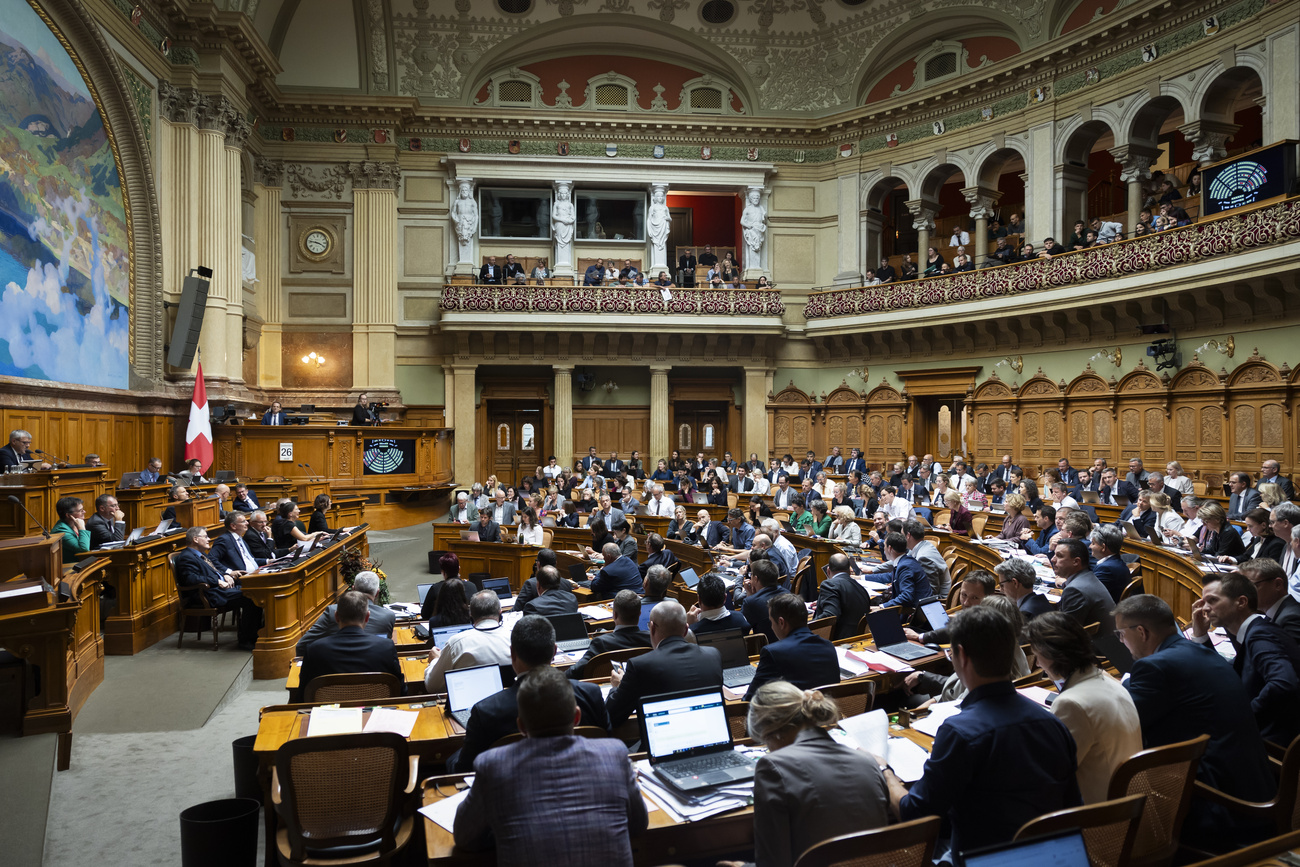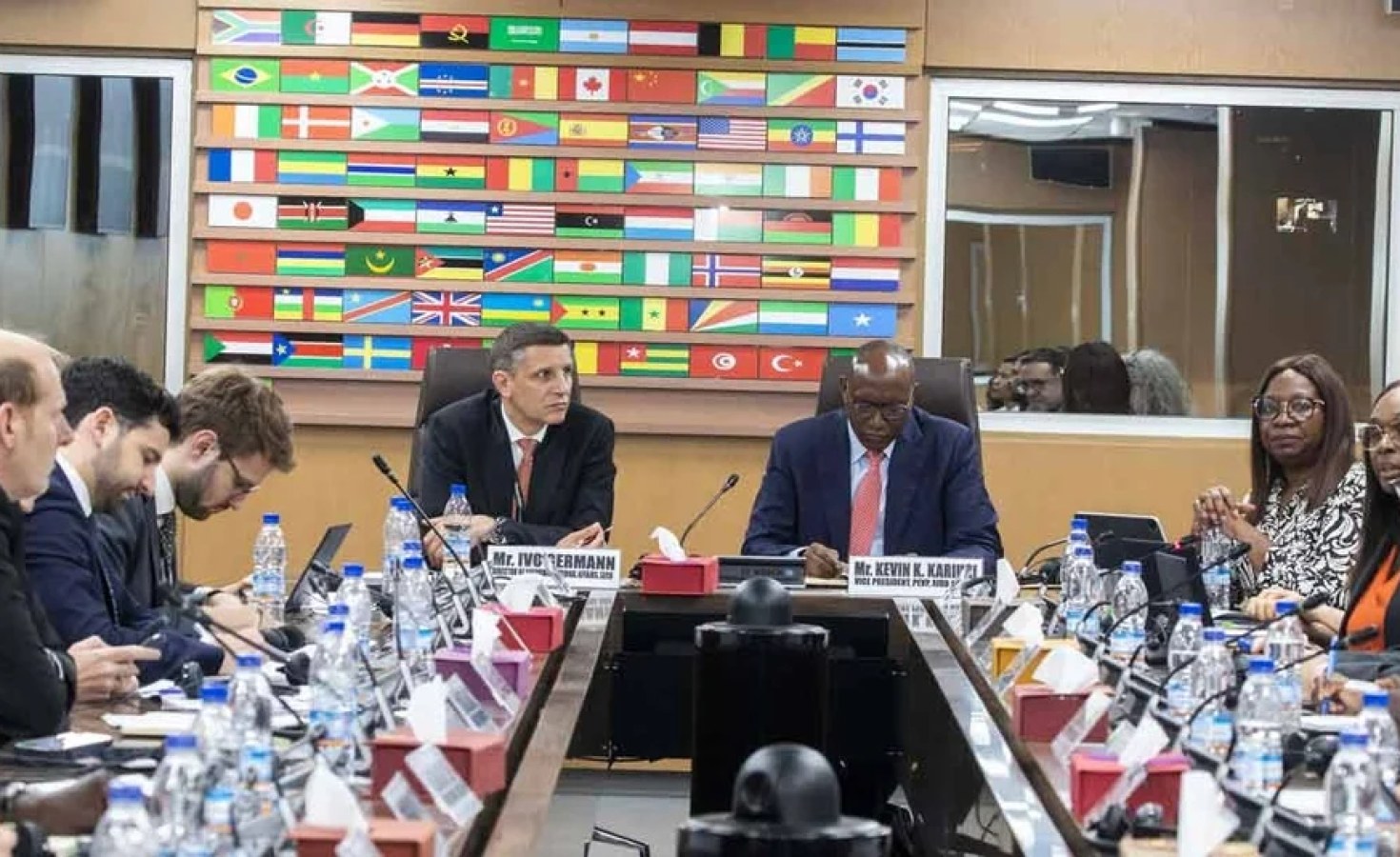
Foreign policy looms large as Swiss parliament begins autumn session

Parliament will open its autumn session on September 8. Foreign policy and geopolitics are set to dominate the agenda. And with three initiatives and a special asylum session, the Swiss People’s Party is shaping the tone.
We begin with the items that are particularly relevant for the Swiss Abroad this session:
Swiss Abroad: What to watch this autumn session
A new attempt is in the works to allow Swiss citizens abroad use Swiss-based bank accounts, without discrimination. A motion External linkby Geneva senator Mauro Poggia wants the government to take the corresponding step via the state-owned PostFinance bank. The Senate will decide on the issue on September 25.
The Senate plans to ratify a social security agreement between Switzerland and Argentina, giving Swiss pensioners there clearer legal footing.
The 13th payment of the old-age and survivors’ pension will be introduced in December 2026, which also concerns Swiss pensioners abroad. But it is still not clear how it will be financed. Interior Minister Elisabeth Baume-Schneider wants an increase in VAT, while the Senate would add payroll deductions. The ball is now in the House of Representatives’ court. In the meantime, transitional scenarios are being considered which would bridge the gap until a new reform can deliver a lasting fix. An extra CHF4 billion to CHF5 billion will be needed each year.
Are you a Swiss Abroad who holds cryptocurrency assets in Switzerland to avoid being taxed in your country of residence? The government is looking to make crypto assets as transparent as ordinary bank accounts by introducing an automatic exchange of information. The proposal stands a good chance in the Senate: its committee has already backed it unanimously.
Two ostensibly marginal proposals about Swiss mercenaries are particularly interesting because they come from opposing sides. It is forbidden for Swiss nationals to fight in foreign conflicts, but now proposals are being considered in which mercenaries would be granted clemency. People’s Party parliamentarian Lukas Reimann wants to restore the legal status of those who fought against the Islamic State in Syria. And Social Democrat parliamentarian Jon Pult wants to protect Swiss fighters who joined Ukraine’s defence against Russia. They both argue that the end justifies the means. Swissinfo reported on one such case earlier.

More
The Swiss man risking his life as a mercenary in the Ukraine war
Votes: Three People’s Party initiatives on the agenda
During this session, parliamentarians will continue putting proposals into the pipeline which voters will decide on next year. Of the six initiatives on the agenda, three come from the Swiss People’s Party – and all of them are heavyweights.
The House of Representatives will debate the neutrality initiative, which would establish a stricter interpretation of neutrality in the constitution. However, those who proposed the initiative have encountered a problem. Switzerland’s defence industry is already suffering the consequences of neutrality policy as it is today.
Partner countries have been cancelling orders because Switzerland blocks re-export to Ukraine. This threatens domestic arms manufacturers – and the People’s Party initiative is only likely to exacerbate the situation. Now, it is in danger of losing support of pro-army and business constituencies. The initiative needs a watered-down War Materiel Act to get off the ground, which will be difficult to achieve.
Also on the agenda: daycare costs and licence fees
The People’s Party “No 10-million Swiss!” initiative is also on the agenda in the House of Representatives. It would compel the Federal Council, the executive body of government, to limit immigration. We have examined the debate here.
The Senate is debating the “200 francs is enough!” initiative, with which the People’s Party wants to reduce the fees for the Swiss Broadcasting Corporation (SBC), the parent company of Swissinfo. None of the three People’s Party initiatives are likely to find majorities in parliament, but all have potential to spark heated referendum campaigns.

Also on the agenda is the Social Democrats’ childcare initiative, which seeks direct federal funding for parents using external childcare. An indirect counter-proposal has been submitted. The House of Representatives will make an initial decision this session.
The Senate will be the first chamber to examine the climate fund initiative. It calls for Switzerland to invest CHF5 billion-CHF10 billion per year in climate change measures.
Lastly, there is the “cash initiative.” The government’s counter-proposal has already been accepted, but some differences between the two chambers of the Federal Assembly still need to be ironed out.
Foreign policy: A reaction to Washington
As far as geopolitics and foreign policy are concerned, Parliament is once again proving itself a reliable reflection of global affairs this autumn.
The war in the Gaza Strip is a widespread concern. Senator Carlo Sommaruga of the Social Democrats wants Switzerland to condemn “Israel’s crimes”, while a people’s initiative from the canton of Geneva is calling for the recognition of Palestine.
Recent shifts in US policy are also reflected in several parliamentary motions, the most significant of which comes from the House of Representatives’ security policy committee. Following Switzerland’s experience with the purchase of US fighter jets, it is calling for efforts to reach an agreement with the EU in the area of security and defence. The government recommends that the motion be adopted.
Autumn session marked by Trump
Meanwhile, Basel senator Eva Herzog of the Social Democrats is calling for stronger support of Switzerland’s pharmaceutical industry – a reaction to Trump’s tariff offensive. Herzog’s co-party member Baptiste Hurni is also concerned. He will ask the Senate how the Trump administration would respond to the question: “How will Switzerland safeguard its prosperity?”
In another motion linked to the current administration’s policy, Herzog is calling for Switzerland to raise development aid spending to the “agreed target” of 0.7% of gross national income. This comes after the US government forced the development aid agency USAID to downsize operations worldwide.
Two legal amendments concerning border protection and asylum are likely to give rise to major debates about Switzerland and the EU in the autumn session. Switzerland is set to follow changes in EU law which adjust the European migration and asylum pact and harmonise the Schengen Borders Code. One such change is allowing checks at Europe’s internal borders to be reintroduced.
Foreign trade: Hundreds of millions in guarantees for Africa
A rather exotic matter will go to the Senate this autumn. The government is asking parliament to release CHF1.56 billion as guaranteed capital for the African Development Bank. The bank has got into difficulties because member country Zimbabwe has accumulated payment arrears.

According to a media report, Switzerland is trying to use the bank to promote Swiss private sector deals in Africa. “With its participation, Switzerland secures influence in the bank,” writes the Federal Council. Guaranteed capital is only a contingent liability and has never been called on. Swissinfo reported on the new Swiss Africa strategy.

More
Africa’s relevance is growing – and everyone wants in
The House of Representatives will also consider approval of an update to the free trade agreement between Switzerland and Chile in the autumn session. This would allow Switzerland to export more chocolate to Chile and Chile to supply more wine to Switzerland.
Meanwhile, the House of Representatives’ Foreign Affairs Committee wants to require that strategic commodities be a mandatory topic of every negotiation in future free trade agreements.
International Geneva: Federal aid under scrutiny
In June, the Federal Council decided to bolster support of International Geneva as a location for international organisations by earmarking CHF269 million for this purpose. Geneva plays a central role in Swiss foreign policy.
Now the House of Representatives’ Finance Committee is intervening. It wants to make massive cuts and freeze federal support for Geneva at the level of the previous funding strategy. An initial decision on this proposal lies with the House of Representatives.
Domestic policy: fighter jets, debt brake and asylum
As far as domestic policy is concerned, the additional cost of procuring new fighter jets will be an issue. A proposal from the left aims to ensure that any necessary supplementary credit from parliament can be put to a referendum. This means that the people would be able to vote on fighter jets again.
The Social Democratic Party has also tabled two motions on the debt brake. One is in the Senate and one in the House of Representatives. Both want to relax the debt brake so that budget surpluses are no longer used solely to reduce debt, but can also be channelled into the federal budget.
From the right, on the other hand, the Swiss People’s Party is again bringing forward a raft of ideas in both houses of the Federal Assembly for tightening up the asylum system. In a special session, the party wants to introduce payment cards for people in the asylum process, limit legal assistance, and put tighter restrictions on where they can live, among other things.
Fishy business
Don’t forget the fish! It may sound unusual, but seems to be an urgent issue. Swiss rivers apparently no longer offer fish a sustainable habitat. Three initiatives are addressing this issue. One concerns the fish species in the Doubs, another pushes for better catches for hobby fishermen and the last is a federal action plan “to keep our waters alive”. The last will be presented to the House of Representatives – with strong support from the Federal Council.
The autumn session of parliament runs from September 8-26.
Edited by Samuel Jaberg, adapted from German by David Kelso Kaufher/ac
This article was amended with extra information on September 9

In compliance with the JTI standards
More: SWI swissinfo.ch certified by the Journalism Trust Initiative































You can find an overview of ongoing debates with our journalists here . Please join us!
If you want to start a conversation about a topic raised in this article or want to report factual errors, email us at english@swissinfo.ch.